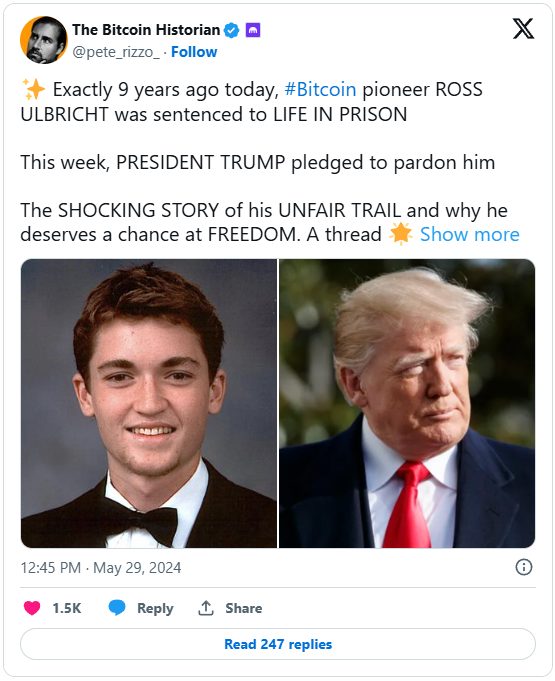Update: Ross Ulbricht was officially pardoned by US president Donald Trump on the 22nd of January 2025.
Nine years ago, Ross Ulbricht, a Bitcoin pioneer, was sentenced to life in prison without the possibility of parole. This week, former President Donald Trump made headlines by pledging to pardon him. Ulbricht’s journey from the founder of the infamous Silk Road marketplace to a symbol of judicial overreach and prosecutorial misconduct is a story fraught with controversy, legal battles, and a growing movement advocating for his release.
The Rise of Silk Road and Ulbricht’s Libertarian Dream
In 2011, at just 27 years old, Ross Ulbricht created Silk Road, perhaps the first major Bitcoin marketplace. Driven by his libertarian ideals and a vision of free trade, Ulbricht designed Silk Road as a platform where users could buy and sell anything consensually, free from government interference. The site quickly became a haven for those seeking to purchase illegal drugs and other contraband anonymously, utilizing Bitcoin’s decentralized nature to maintain privacy.
Ulbricht’s outspoken beliefs in libertarianism, the end of the War on Drugs, and the use of Bitcoin as a tool for financial freedom made him a target for federal authorities. By 2013, as Bitcoin’s price soared and Silk Road gained mainstream attention, the state intensified its efforts to dismantle the marketplace and bring its creator to justice.
The Arrest and the Start of Legal Battles
In October 2013, Ross Ulbricht was arrested in a dramatic sting operation and charged with money laundering, computer hacking, and conspiracy to traffic narcotics. The arrest marked the beginning of a legal odyssey characterized by questionable tactics and allegations of government misconduct. Ulbricht was initially placed in solitary confinement for six weeks and was denied bail despite his family’s efforts to secure his release by mortgaging their homes to raise $1 million.
From the outset, inconsistencies in the government’s case began to surface. The FBI claimed to have located the Silk Road servers by solving a CAPTCHA, a story that many experts disputed. Additionally, the methods used to obtain evidence raised concerns about potential Fourth Amendment violations.
The Trial and Its Controversial Aspects
Ross Ulbricht’s trial was fraught with irregularities. He was ultimately convicted and given an astonishingly harsh sentence: double life imprisonment plus 40 years, without the possibility of parole. This draconian punishment starkly contrasted with the sentences handed down to other individuals involved in Silk Road. For instance, the site’s top drug dealer, known as “SuperTrips,” received only 10 years, while Roger Clark, a key administrator, received 20 years.
Prosecutors portrayed Ulbricht not as an entrepreneur, but as a dangerous drug kingpin involved in murder-for-hire plots, charges for which he was never formally tried. Despite the lack of concrete evidence, these uncharged allegations were presented to the jury, influencing their perception and contributing to the severity of his sentence. In 2018, these murder-for-hire charges were dismissed, but by then, the damage was done.
Compounding the controversy were revelations of corruption among the investigating agents. Two DEA agents were later convicted for extorting 80,000 Bitcoin from Ulbricht and obstructing justice. These facts were hidden from the jury during the trial, preventing Ulbricht from mounting a full defense. Furthermore, he was barred from calling key witnesses, including Bitcoin experts like Andreas Antonopoulos, and from cross-examining government witnesses.
The Movement for Ulbricht’s Freedom
Ross Ulbricht’s case has sparked widespread outrage and support from various quarters, including prominent figures in the Bitcoin community and beyond. His mother, Lyn Ulbricht, has been a tireless advocate, spearheading the Free Ross campaign and highlighting the injustices of his trial. The campaign has gained significant traction, drawing attention to the broader implications of Ulbricht’s case for internet freedom and justice reform.
In 2021, Ross spoke from prison at the Bitcoin conference in Miami, expressing his continued hope for freedom and the desire to contribute positively to society. This appearance led to his temporary placement in solitary confinement, further underscoring the harsh conditions of his imprisonment.
Political Support and the Path to Pardon
The quest for Ulbricht’s release gained a major boost in 2023 when Robert Kennedy Jr. announced that he would revisit Ulbricht’s sentence if elected president. This endorsement was soon followed by similar commitments from other political figures, including Republican candidate Vivek G. Ramaswamy. The most significant development came last week when Donald Trump publicly vowed to pardon Ulbricht on his first day back in office, should he be re-elected.
Now is the Time
As Ross Ulbricht marks over 11 years behind bars, the movement for his release has never been stronger. With high-profile endorsements and a growing recognition of the injustices he faced, Ulbricht’s freedom appears increasingly within reach. His case serves as a stark reminder of the potential for abuse within the criminal justice system and the enduring power of grassroots advocacy in the fight for justice.
Whether through a presidential pardon or continued legal efforts, the hope for Ulbricht’s release shines brighter than ever. About time to free Ross.
Author Profile

- Ex-community moderator of the Banano memecoin. I have since been involved with numerous cryptocurrencies, NFT projects and DeFi organizations. I write about crypto mainly.
Latest entries
- December 9, 2024Stock MarketMaster the Time Value of Money Financial Concept
- November 18, 2024Stock MarketFinancial Ratios Guide to Measuring Business Performance
- November 11, 2024NewsWireLabour’s UK Budget: A Fiscal Smirk of Contempt for Working People
- October 25, 2024CryptoThe DAO Governance Battle Between Corporations & Blockchain Rebels






